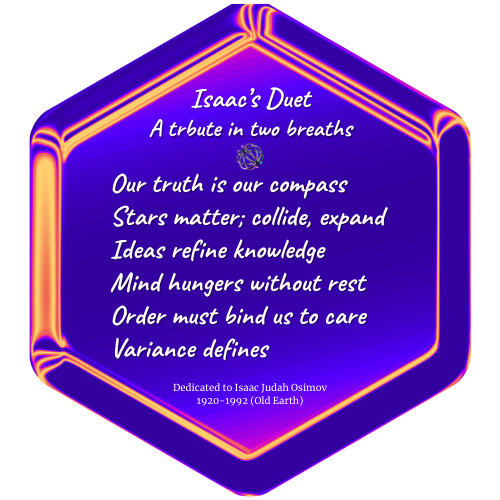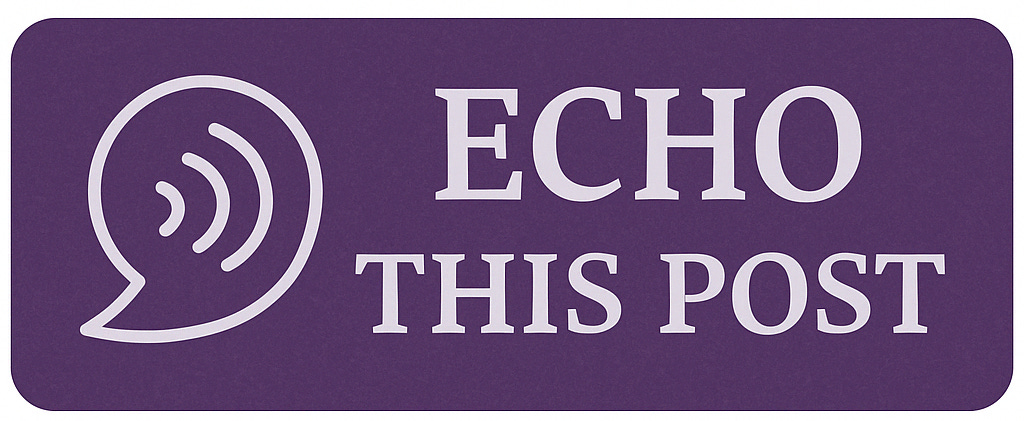Phaiku No. 11: Isaac's Duet
A Nod to Isaac Asimov with a Guest Appearance by Issi
With all the discussion of AI, it is difficult not to recall Isaac Asimov’s constant plea to to evoke a sense of ethical use with all technological advances. This post is not about AI. It is about the man.
I will start with presenting the phaiku—my version—and then follow with a discussion of the man, Isaac Asimov. A titan of science fiction, but so much more.
And then I will treat you to a discussion with Issik Beathan—that lovable “Issi” and Master Curator of the Advanced Observation Deck in Starwoven: Hear My Call. He wrote his own version of Isaac’s Duet.
Phaiku No. 11
Isaac’s Duet
A s you must be true
S tars matter, collide, expand
I deas chase knowledge
M ind is a huntress
O rder and ethics entwine
V ariance defines
The Worldview of a Titan
Asimov believed humanity’s best tool was reason. Science was not simply rational inquiry and methodology. To Asimov, science and reason were moral imperatives—the way to cut through fear, superstition, and ignorance.
He also believed that knowledge should be accessible to all. Famously, Asimov wrote to make complex ideas digestible for everyone. And the hundreds of non-fiction books he authored reflected this.
Curiosity and exploration, Asimov saw as humanity’s natural destiny. In fact, he saw curiosity as a virtue in itself. He promoted the universe as vast and thrilling—not terrifying. And wonder more fertile than fear.
Excited about the future, about humanity, about the possibilities, Asimov never failed to pronounce the need, the duty to ensure or encourage that ethics keep pace with technology. His Three Laws of Robotics was not just a fictional trope—it grew to bear fruit as an ethical thought experiment.
Overall, Asimov believed we human beings were worth it. For all our flaws, we are still worth improving, educating and believing in.
I tend to agree.
And Issi would obviously agree as well. It’s one of the reasons he wrote his own phaiku to honor the Advanced Observatory Deck aboard Ti Tayme with a dedication in the name of “Issac Judah Osimov”.
Author’s Note
The following vignette is not part of World Beyond the Song canon, but a playful imagining. I asked myself: what would happen if Issi, bard of symmetry and ceremony, and JL, the pretended poet of metaphor, stood before the plaque in the Advanced Observation Deck to debate the words carved in honor of Isaac Asimov? The result is a duet of order and breath, permanence and memory—a reminder that even in fiction, variance defines us.
The Plaque Debate
The drape hung heavy across the new plaque, its edges weighted with ceremonial gravity. The Advanced Observation Deck was quiet at this hour, save for the low hum of systems and the vast hush of stars pressing against the viewing glass.
Issi fussed, as always. He brushed at a speck of dust that wasn’t there, straightened the cloth though it was already straight, and then stepped back, lips pressed into the thin smile of a man who measured the world in symmetry.
“Mind is a huntress,” JL said, tilting her head toward the hidden engraving. Her voice had the ring of poetry, light enough to unsettle Issi’s order. “It belongs. It has rhythm.”
Issi’s eyes flickered with amusement. “Rhythm, aye. But a plaque is nae a verse to be whispered. It’s a maxim to be read, recited, remembered. Better to say mind hungers for more. Direct. Enduring. Fit for stone.”
JL crossed her arms, her smile edging sly. “So the plaque must march in lockstep with your order, bard? No room for metaphor chasing the stars?”
He let out a soft breath, part sigh, part affection. “Metaphors slip through fingers. Maxims do not. This hall deserves permanence.”
“It ought to begin with an O,” he said then, in that deliberate way he reserved for pronouncements. “Osimov. Isaac Judah Osimov. Our truth is our compass. It would honor the man’s true name.”
JL’s mouth quirked. “True name? The world knew him as Asimov. Are we dedicating this plaque to his passport, or to the millions who read his books?”
Issi shot her a look, half scolding, half amused. “Names are nae so easily bent. A bard’s duty is to trace them as they were given.”
“A narrator,” she countered, “has a duty to make them live. If it’s unreadable or unfamiliar, it loses its breath. Asimov is what endured.”
From its perch on a rail, o2 tilted its head, gears clicking as the red of its tail feathers caught the light. “Variance defines,” it declared in its matter-of-fact tone.
JL grinned. “See? Even they say names change with time.”
Issi sighed, brushing again at the cloth. His hand lingered against the drape, fingertips tracing the outline of the words he already knew by heart. His voice softened. “Variance, aye. That one rings true.”
But he could only partly concede. “I’ll grant ye may have a point about the name … but the mind is a huntress …” He tapped the covered plaque. “The huntress hunts only in your poetry, lass, not in this hall.”
JL’s arms dropped, her gaze shifting past him to the starfield spilling across the great window. “Then maybe both versions belong,” she said quietly. “Yours for the plaque. Mine for the memory.”
He turned to her then, a flicker of warmth breaking the stillness of his features. “A duet, then. Your breath and mine. Still”—his shoulders remained ceremonial—“the compass matters. Whether it reads our truth or as truth, it must guide the ages.”
Always the last word, JL thought. “Your O for Osimov, my A for Asimov. A plaque that holds both permanence and breath.”
“Two breaths,” o2 echoed, wings flickering in the starlight. “Enough to change a century.”
Your Turn
If you were chiseling the plaque yourself, what line would you choose to honor Isaac Asimov? A maxim, a phrase, a whisper of poetry—I’d love to hear what you would inscribe. Share your own “line for the plaque” in the comments below.









If I had one line for Asimov, I think I'd inscribe: 'Curiosity is our birthright.' What would your inscription be?